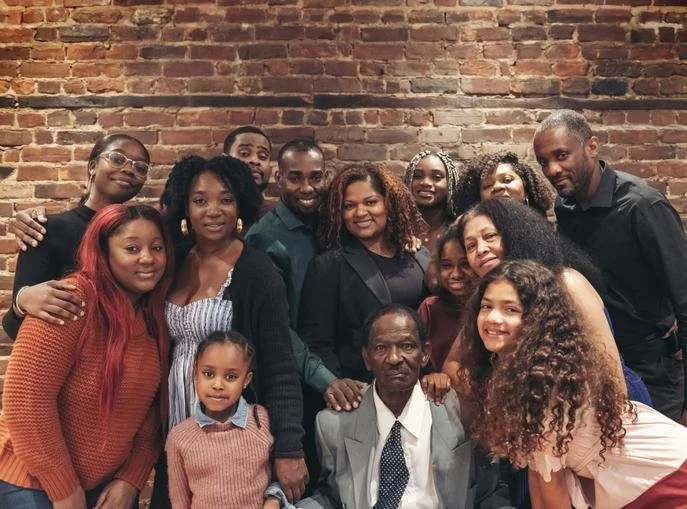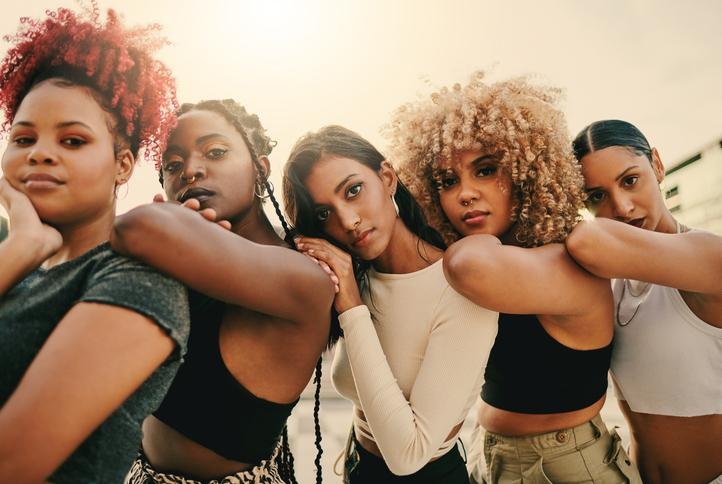“That’s My Cousin”: The Power of Cousin Bonds in the Black Community
In the Black community, cousin relationships go beyond bloodlines, serving as lifelong bonds of friendship, support, and shared cultural identity that shape our earliest memories and hold families together. We discuss it here!
Photo Credit: lisegagne via iStockPhoto.com
By: Jamila Gomez
In the Black community, “cousin” doesn’t just mean your mama’s sister’s kid. It’s deeper than blood. It’s a bond, a lifeline, a whole experience. For so many of us, cousins are our first best friends, our first partners-in-crime, and sometimes the only people who understand the full flavor of what we’re going through. In a world that often tries to break us down, cousin relationships build us up.
Growing up, cousins were the ones we sat at the kiddie table with during Thanksgiving, sneaking extra rolls and giggling through family gossip. They were the ones we shared rooms with during summer breaks, staying up late talking about everything from cartoons to crushes. Cousins helped us learn how to roast, how to play spades, how to braid hair, how to defend ourselves — and how to laugh through pain. That bond doesn’t fade with time. If anything, it gets stronger.
And let’s be real: in many Black families, the cousin network is what holds the whole structure together. We may not always come from traditional nuclear homes, but our families are rich with aunties, uncles, Big Mamas, and cousins who step up, show out, and show love. Your cousin might’ve been your babysitter, your ride to school, your first call after a breakup. They’re your people — your tribe — when the world gets cold.
Cousins often grow up like siblings, especially in households where resources were tight and love had to stretch wide. That closeness builds a unique understanding, an unspoken language that even your closest friends might not get. You share memories, music, inside jokes, and sometimes trauma. But the beauty is in how cousins help you carry it — laughing, praying, healing together.
In today’s world, where everything moves fast and people feel more disconnected than ever, those cousin ties are sacred. They remind us where we come from. They keep us grounded. And for the next generation, it’s up to us to keep that spirit alive — making sure our kids know their cousins, grow with them, and love them like we did.
So when we say, “That’s my cousin,” it’s not just a label. It’s pride. It’s history. It’s love.
Hold your cousins close. Call them. Check on them. Celebrate them. Because in this community, cousin love is family love — and family is everything.
YOU MAY ALSO BE INTERESTED IN:
SHARE TO SOCIAL MEDIA
Choosing Health Over Length — In Life and in Love
Prioritizing health over longevity in life and relationships means letting go of what no longer serves your well-being and embracing emotional, mental, and relational alignment. We discuss it here!
Photo Credit: Delmaine Donson via iStockPhoto.com
By: Jamila Gomez
When we think about health, our minds often go straight to physical wellness—eating clean, getting in daily steps, scheduling regular checkups. But health isn’t just about the body; it’s about our emotional, mental, and relational wellbeing, too. And sometimes, the healthiest thing we can do—for ourselves and for those we care about—is to let go, even if it means something ends sooner than we hoped.
There’s a common trap we fall into: believing that the length of something is proof of its worth. We celebrate long relationships, long careers, long lives. But what if the real measure of value isn’t length, but quality?
This idea especially hits home in relationships. We’re often taught to fight for love, to stick things out no matter what, to believe that longevity equals success. But staying in something that drains us, damages us, or slowly erodes our sense of self isn’t romantic—it’s exhausting. Choosing to prioritize the health of a relationship over the length of it can be one of the most powerful, loving choices we make.
Sometimes that means having the hard conversation. Sometimes it means walking away—not because you gave up, but because you chose peace. Because you finally understood that real love shouldn’t cost your wellbeing.
Healthy relationships are marked by mutual respect, communication, trust, and growth. They’re not perfect, but they’re safe. They nurture you. When those foundations crumble and can’t be rebuilt, clinging to the shell of something “for the sake of time” only leads to more hurt.
The same principle applies to life itself. We’re constantly bombarded with ways to extend our years—diets, supplements, hacks—but what’s the point of a long life if it’s filled with stress, disconnection, or suffering? A shorter life full of meaning, love, laughter, and alignment with your values can be far richer than one stretched out in survival mode.
Choosing health over length is about intentional living. It’s about asking: Does this nourish me? Am I growing here? Is this kind to my soul? If the answer is no, then you owe it to yourself to realign—even if it means letting go of what’s familiar.
In the end, we remember the moments we felt most alive, not just the number of years we lived. The same is true in love. A short, healthy relationship that helped you grow is far more meaningful than a long one that left you smaller.
So whether it’s life or love—choose health. Always.
YOU MAY ALSO BE INTERESTED IN:
SHARE TO SOCIAL MEDIA
How to Love Someone Who Suffers from Anxiety or Depression
Supporting a loved one with anxiety or depression means listening without judgment, offering consistent care, encouraging professional help, and educating yourself about mental health—especially within the Black community. We discuss it here!
Photo Credit: rgbspace via iStockPhoto.com
By: Jamila Gomez
In our community, we often hear phrases like “pray about it,” “be strong,” or “you’ll be fine” when it comes to mental health. But the truth is, anxiety and depression are real, heavy burdens that don’t disappear overnight — and sometimes, our loved ones are fighting silent battles we can’t see. If someone you care about is struggling, knowing how to show up for them with love, patience, and understanding can make all the difference.
1. Listen Without Judgment
One of the most powerful things you can do is simply listen. A lot of us grew up in households where feelings weren’t always talked about, so when someone opens up about their mental health, it’s not easy. Let them speak their truth without jumping to fix, lecture, or minimize their experience. Sometimes, they don’t need answers — they need to feel heard and seen.
2. Educate Yourself About Mental Health
Anxiety and depression don’t always look like sadness or panic attacks. Sometimes, it looks like isolation, irritability, fatigue, or even overworking to avoid feelings. Take time to learn about how these conditions show up, especially in Black folks who often carry the extra weight of systemic stress and cultural expectations to “keep it together.”
3. Offer Real Support — Not Just Words
Saying “I’m here if you need me” is a beautiful sentiment, but actions speak louder. Offer to sit with them, check in regularly, or help with small tasks like errands or cooking. Depression and anxiety can make even basic things feel overwhelming. Your presence and consistency remind them they’re not alone.
4. Be Patient With Their Healing
Mental health struggles don’t have a timeline. There will be good days and bad days. Your loved one may cancel plans, withdraw, or seem distant — try not to take it personally. Healing isn’t linear, and your understanding gives them the space to breathe without added pressure.
5. Encourage Professional Help — Without Shame
In the Black community, therapy has sometimes carried stigma, but it’s crucial to remind your loved one that getting help is a form of strength, not weakness. Encourage them to talk to a professional when they’re ready, and if they’re open to it, help them find a culturally competent therapist who understands the nuances of Black mental health.
6. Protect Your Own Energy, Too
Loving someone with anxiety or depression requires empathy, but it’s also important to care for yourself. Set boundaries when you need to, and don’t be afraid to seek your own support as you walk alongside them.
At the end of the day, love is about showing up, even when the road is hard. Your presence, patience, and compassion could be the light that helps your loved one find their way back to themselves.
YOU MAY ALSO BE INTERESTED IN:
SHARE TO SOCIAL MEDIA
Is Marriage Still the Goal? A Look at Modern Black Relationships
As modern Black love continues to evolve beyond traditional expectations, many are redefining relationship success by prioritizing authenticity, emotional well-being, and personal fulfillment over marriage as a required milestone. We discuss it here!
Photo Credit: Anchly via iStockPhoto.com
By: Jamila Gomez
Throughout generations, people have viewed marriage as the ultimate indicator of relationship success which serves as a symbol of stability alongside love and legacy. Marriage was viewed as a way to establish solid families that in turn would create better communities among Black people. The modern world presents different priorities and expectations along with altered realities which cause people to wonder about marriage goals.
Research shows that Black marriage statistics show a decreasing trend during the past several decades. Many African Americans currently delay marriage or choose not to marry at all. The reasons behind this trend exist as complex factors which include economic differences alongside changes in gender roles and free will decisions.
The question “When are you going to settle down and get married?” was commonly heard during our childhood as if marriage served as the ultimate life milestone. Many modern Black singles across millennial and Gen Z generations view marriage as an available choice instead of a requirement to achieve happiness and fulfillment in partnership.
People have started this change by observing past generations. Many people observed marriages which seemed perfect in public records but lacked genuine happiness in private spaces. We watched as people stayed trapped in toxic relationships because traditional views of Black love demanded marriage no matter the cost to individual well-being.
The modern Black community now embraces love without requiring marriage to validate its worth. The number of couples who select long-term relationships without marriage commitments keeps growing. Many couples decide to establish financial security and achieve their professional targets as well as care for their mental health and raise children before getting married or choose alternative paths.
The discussion must include the obstacles that stand in the way. Economic inequality directly affects the development of Black relationships. Systemic racism combined with mass incarceration along with the wealth gap have influenced how people marry and when they choose to do so.
Even though marriage still exists it is not necessary for everyone. Black couples continue to exchange vows and establish strong relationships which combine their love with faith and their connection to the community. Modern society has introduced a new perspective because people now recognize various methods to measure love success beyond marriage.
The decision to make marriage a life goal depends entirely on the individual person. Some couples dedicate themselves to creating business empires together. Some people desire freedom and peaceful companionship alongside the absence of legal documentation. The life choices people make are equally valid.
The Black love experience continues to transform as it manifests through various forms of partnership including marriage as well as singleness and committed relationships and situationships and self-love. Maybe the new objective should be discovering what truly brings you satisfaction and authenticity and sustainability.
YOU MAY ALSO BE INTERESTED IN:
SHARE TO SOCIAL MEDIA
Practicing Gratitude: A Radical Act of Joy
Practicing gratitude as a Black person is a revolutionary act of joy, resilience, and healing that honors our ancestors, celebrates our culture, and empowers us to thrive despite systemic challenges. We discuss it here!
Photo Credit: Tassil via iStockPhoto.com
By: Jamila Gomez
Being Black in this world is a unique experience—one filled with beauty, resilience, and deep cultural richness, but also with challenges that can be exhausting. Every day, we navigate spaces that weren’t always designed for us, carry generational struggles, and face both overt and subtle forms of discrimination. Yet, despite all of that, we continue to create, thrive, and love. And one of the most powerful ways we can protect our joy is through the practice of gratitude.
Gratitude isn’t about ignoring struggles or pretending oppression doesn’t exist. It’s about recognizing our power, our community, and the blessings that sustain us. It’s about reclaiming our joy in a world that often tries to dim our light.
Gratitude as Resistance
There’s something revolutionary about choosing to see the good in your life when society constantly reminds you of its hardships. When we take time to acknowledge what we’re grateful for—our ancestors’ sacrifices, our culture’s resilience, the love we share with our people—we are resisting narratives that tell us we should always be struggling.
Black joy is an act of defiance. Gratitude strengthens that joy by reminding us that, despite what history and systems have tried to do, we are still here. We are still creating, still innovating, still loving, still pushing forward.
Finding Gratitude in the Everyday
Practicing gratitude doesn’t have to be complicated. It can be as simple as taking a few minutes in the morning to reflect on what you appreciate, journaling about small wins, or even telling your people how much they mean to you. Here are some ways to integrate gratitude into your daily life:
1. Honor Your Ancestors – Take a moment to reflect on those who came before you. Whether through prayer, storytelling, or simply acknowledging their sacrifices, expressing gratitude for their resilience is a powerful way to stay grounded.
2. Celebrate Black Creativity – Be grateful for the music, art, literature, and innovation that Black people have contributed to the world. Whether it’s a song that lifts your spirit or a book that inspires you, take time to appreciate our cultural genius.
3. Thank Your Community – From family and friends to mentors and strangers who support you, recognize the people who show up for you. Gratitude strengthens our bonds and reminds us that we’re not alone.
4. Appreciate Your Own Growth – You’ve survived things that were meant to break you. Give yourself credit. Express gratitude for your strength, your growth, and the lessons you’ve learned.
Gratitude Keeps Us Whole
Practicing gratitude doesn’t mean ignoring reality. It means choosing to see the beauty in the midst of struggle, to uplift ourselves, and to keep our spirits intact. In a world that often tries to wear us down, gratitude is a tool for survival, healing, and joy. And that, in itself, is revolutionary.
YOU MAY ALSO BE INTERESTED IN:
SHARE TO SOCIAL MEDIA
Navigating Wellness in a Hyper-Productive Society
In a world driven by hustle culture, finding wellness means redefining success, setting boundaries, and prioritizing balance over burnout for a more fulfilling and sustainable life. We discuss it here!
Photo Credit: Marco VDM via iStockPhoto.com
By: Jamila Gomez
In a world that glorifies hustle culture, self-worth is often measured by output. From the moment we wake up, we’re bombarded with productivity hacks, morning routines optimized for efficiency, and the pressure to squeeze the most out of every minute. While ambition isn’t inherently bad, an obsession with doing more can take a serious toll on mental and physical health. The challenge, then, is finding balance—navigating wellness without feeling like we’re falling behind.
The Productivity Trap
Modern society rewards busyness. Whether it’s climbing the corporate ladder, monetizing hobbies, or optimizing daily routines, we’re conditioned to believe that slowing down is synonymous with laziness. This mindset leads to burnout, anxiety, and a constant feeling of inadequacy. Even rest becomes another productivity tool—something we “schedule” so we can get back to work with renewed energy.
But wellness isn’t just about recovering from overwork; it’s about creating a sustainable lifestyle that prioritizes health, joy, and fulfillment beyond professional success.
Redefining Success
The first step in navigating wellness is shifting our definition of success. Instead of equating it with output, we should consider a more holistic view—one that includes mental health, relationships, personal growth, and overall happiness. True success isn’t just about how much we accomplish but how we feel while doing it.
This shift requires unlearning societal expectations and tuning into what actually makes us feel fulfilled. Are we working long hours because we genuinely enjoy our careers, or because we fear falling behind? Are we saying yes to every opportunity because we want to, or because we feel guilty for saying no?
Practical Strategies for Wellness
While mindset shifts are crucial, practical strategies can help reinforce a healthier approach to wellness:
1. Prioritize Rest Without Guilt – Rest is not a reward for hard work; it’s a necessity. Quality sleep, relaxation, and leisure should be non-negotiable, not just tools to boost productivity.
2. Set Boundaries – Overworking isn’t a badge of honor. Define clear work-life boundaries, whether that means logging off at a certain time, limiting weekend work, or saying no to additional responsibilities.
3. Engage in Activities Without an End Goal – Not everything needs to be monetized or optimized. Read a book for enjoyment, take a walk without tracking steps, or engage in hobbies just because they make you happy.
4. Practice Mindfulness – Being present in the moment can reduce stress and help break the cycle of constant busyness. Simple practices like deep breathing, journaling, or unplugging from technology can make a difference.
5. Reevaluate Your Goals – Regularly check in with yourself. Are your goals aligned with your well-being? If not, adjust them. Productivity should serve your life, not consume it.
Wellness in a hyper-productive society isn’t about abandoning ambition—it’s about integrating balance. We don’t have to choose between success and well-being; we just need to redefine what success means. By prioritizing health, joy, and sustainability over endless hustle, we create a life that’s not just productive but genuinely fulfilling.
YOU MAY ALSO BE INTERESTED IN:
SHARE TO SOCIAL MEDIA
How to Plan Rejuvenating and Culturally Enriching Trips for Black Travelers
Plan a rejuvenating and culturally enriching trip as a Black traveler by choosing meaningful destinations, prioritizing wellness, supporting Black-owned businesses, exploring historical landmarks, and ensuring safety for a fulfilling travel experience. We discuss it here!
Photo Credit: Three Spots via iStockPhoto.com
By: Jamila Gomez
Traveling can be an opportunity for both relaxation and cultural enrichment, especially for Black travelers seeking destinations that celebrate heritage, history, and wellness. Thoughtful trip planning ensures a balance between personal rejuvenation and deep cultural engagement. Here’s how to craft an itinerary that leaves you refreshed and inspired.
1. Choose a Destination with Meaning
Selecting a destination that aligns with your interests and cultural background can enhance your travel experience. Places like Ghana, Brazil, Cuba, and New Orleans offer rich Black history and vibrant cultural expressions. For relaxation, consider Black-owned resorts in the Caribbean or wellness retreats in Africa. Research Black history tours, Afrocentric cultural festivals, and Black-owned businesses in your chosen location.
2. Prioritize Wellness and Self-Care
Rejuvenating travel isn’t just about sightseeing—it’s about restoring your mind and body. Look for destinations with spas, natural hot springs, or meditation retreats. Many wellness retreats cater specifically to Black travelers, offering experiences like yoga in Kenya, traditional healing practices in South Africa, or spa treatments rooted in African and Caribbean traditions. Even if you’re visiting a bustling city, set aside time for self-care, whether it’s a beach day or a visit to a local wellness center.
3. Support Black-Owned Businesses and Experiences
To make your trip more enriching, seek out Black-owned accommodations, restaurants, and tour companies. Websites like the Black Travel Alliance and EatOkra help travelers find Black-owned businesses worldwide. Dining at Black-owned restaurants, shopping at local markets, and booking experiences with Black tour guides provide economic support while giving you a more authentic, community-driven experience.
4. Explore Historical and Cultural Landmarks
Visiting sites significant to Black history adds depth to your travels. In the U.S., cities like Washington D.C., Atlanta, and Charleston have extensive Black heritage tours. Internationally, you can walk through the Door of No Return in Senegal, explore the Maroon villages of Jamaica, or visit Salvador, Brazil, known for its strong African influence. Museums, historical sites, and cultural centers provide deeper insight into the struggles and triumphs of the African diaspora.
5. Travel with Like-Minded Groups
If solo travel isn’t your style, consider joining a group trip catered to Black travelers. Companies like Travel Noire, Black & Abroad, and Nomadness Travel Tribe curate trips that mix adventure, culture, and connection. These groups offer the comfort of shared experiences and the opportunity to build lasting friendships.
6. Stay Mindful of Safety and Comfort
Research the social climate of your destination regarding race and safety. Some places are more welcoming than others, so check travel advisories and read firsthand experiences from other Black travelers. Pack accordingly, know your rights in a foreign country, and ensure you have access to local resources in case of emergencies.
By blending cultural exploration with personal wellness, Black travelers can create trips that are both soul-nourishing and deeply meaningful. Thoughtful planning ensures that each journey is not only a getaway but also a powerful connection to heritage, history, and personal growth.
YOU MAY ALSO BE INTERESTED IN:
SHARE TO SOCIAL MEDIA
Self-Advocacy in the Workplace: Asking for Raises, Promotions, and Respect
Learn how to advocate for yourself in the workplace by negotiating a raise, securing a promotion, and demanding respect to advance your career with confidence. We discuss it here!
Photo Credit: Three Spots via iStockPhoto.com
By: Jamila Gomez
Self-advocacy is essential for career growth. If you don’t speak up for yourself, you risk stagnation while others take opportunities that could have been yours. Advocating for your worth in the workplace—whether for a raise, a promotion, or simply respect—requires preparation, confidence, and strategy.
Asking for a Raise
Many employees hesitate to ask for a raise, fearing rejection or retaliation. But if you’re delivering value, you deserve fair compensation. The key is to prepare.
1. Know Your Market Value – Research salaries for your role in your industry and location using sources like Glassdoor, Payscale, or industry reports. If you’re underpaid compared to the market, you have leverage.
2. Track Your Achievements – Keep a record of your accomplishments, including revenue increases, cost savings, successful projects, or any metric that proves your contributions. The stronger your case, the harder it is to ignore.
3. Time It Right – The best time to ask is after a big win, during performance reviews, or when your company is doing well financially. Avoid making your request during company downturns or right after layoffs.
4. Be Direct and Professional – Approach the conversation with confidence. Instead of saying, “I was hoping for a raise,” say, “Based on my contributions and market comparisons, I believe a salary adjustment is warranted.”
Positioning Yourself for a Promotion
Promotions aren’t just given; they’re earned and often negotiated. If you’re eyeing a higher position, be proactive.
1. Take Initiative – Show leadership in your current role. Volunteer for challenging projects, mentor colleagues, and consistently exceed expectations.
2. Express Your Interest Early – Don’t assume your boss knows you want a promotion. Have a conversation about your career goals and ask what you need to do to move up.
3. Develop New Skills – Identify the skills required for the next level and work on them. This could mean taking courses, earning certifications, or asking for stretch assignments.
4. Build Relationships – Promotions often involve decision-makers beyond your direct supervisor. Cultivate strong relationships with upper management and key stakeholders.
Demanding Respect in the Workplace
Respect is non-negotiable. If you feel undervalued, ignored, or disrespected, address it head-on.
1. Set Boundaries – If someone is treating you unfairly, don’t tolerate it. Say, “I’d appreciate it if you spoke to me with respect,” or “I expect to be included in these discussions.”
2. Document Issues – If disrespect is persistent, keep a record. Documentation strengthens your case if you need to escalate the issue.
3. Address It with Leadership – If necessary, bring concerns to HR or higher management. A workplace that tolerates disrespect is not one where you should invest your future.
Self-advocacy isn’t just about asking—it’s about knowing your worth and asserting it. When you push for fair pay, career advancement, and professional respect, you don’t just benefit yourself—you help set a precedent for others..


















